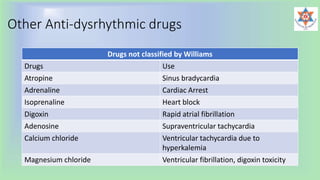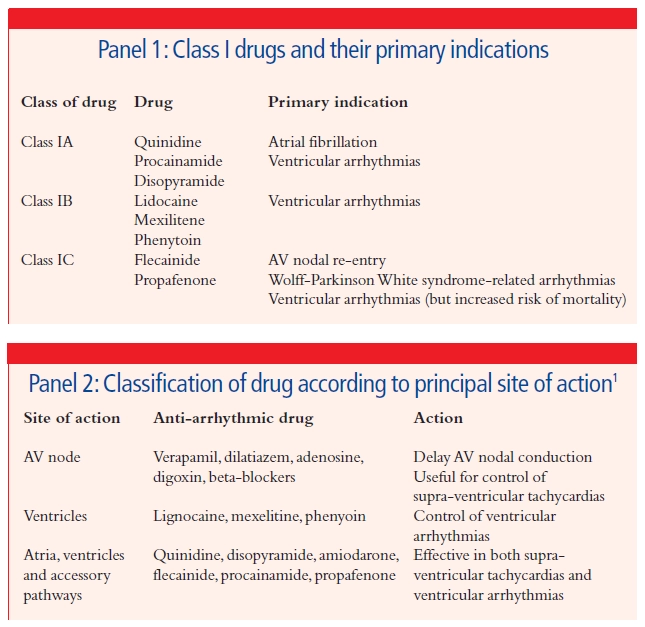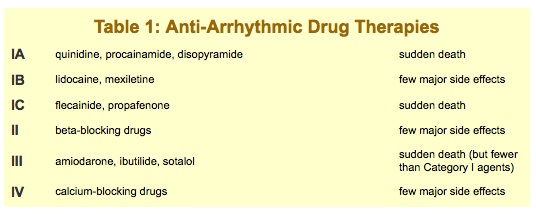Antiarrhythmics work by slowing the electrical impulses in the heart so that your heart can return to a regular rhythm. Classification of Antiarrhythmic Drugs The antiarrhythmic drugs are classified Vaughan Williams and Singh 1970 into the following four classes based on the electrophysiological effects.

Drugs Used In Cardiac Arrhythmias
Anticoagulant medicines like warfarin.

. Used to treat or improve symptoms of cardiovascular conditions including high blood pressure and heart failure. 2 Differentiate between the atrial dysrhythmias and the ventricular dysrhythmias. There are many medications that are used to treat prevent or lessen the severity of irregular heart rhythms arrhythmias.
4 Identify baseline nursing assessments that. Angiotensin-II antagonists like losartan. Anti-arrhythmic medicines like amiodarone.
Start studying Drugs used to treat cardiac arrhythmias. Therapies to treat heart arrhythmias include vagal maneuvers and cardioversion to stop the irregular heartbeat. Commonly used antiarrhythmic drugs include amiodarone Cordarone Pacerone sotalol Betapace propafenone Rhythmol and dronedarone Multaq.
Learn vocabulary terms and more with flashcards games and other study tools. Chapter 24 Drugs Used to Treat Dysrhythmias Objectives 1 Describe the anatomic structures and conduction system of the heart. Atropine Atropine works oppositely to adenosine.
3 Describe the therapeutic response that should be observable when an antidysrhythmic drug is administered. 64 rows Asystole 9 drugs AV Heart Block 8 drugs Bradyarrhythmia 2 drugs Cardiac. Oral dofetilide is useful for acute pharmacological cardioversion in patients with atrial fibrillation or atrial flutter.
Class I - Sodium-channel blockers Class II - Beta-blockers Class III - Potassium-channel blockers Class IV - Calcium-channel blockers Miscellaneous - adenosine - electrolyte supplement magnesium and potassium salts - digitalis compounds cardiac glycosides - atropine muscarinic receptor antagonist. Drugs in this class approved by the US FDA for treatment of various arrhythmias include propranolol Inderal and others acebutolol Sectral and others and esmolol Brevibloc. Theyre also used with therapy for cardiac arrhythmias and in treating angina pectoris.
It is important to note that for a given condition a particular drug may not be efficacious and in fact it may precipitate other arrhythmias or adverse cardiovascular effects eg cardiac depression hypotension. 4 hours agoAmong patients with an implantable cardioverter-defibrillator ICD who have symptomatic ventricular tachycardia catheter ablation was found to be superior to antiarrhythmic drugs AADs according to results of a study published in the Journal of the American College of Cardiology. There are lots of different medicines used to treat diseases of the heart but they all belong to a few main groups including.
This group of medications are called antiarrhythmics. Whereas adenosine makes it harder for electrical signals to produce a heartbeat atropine makes it easier. Beta-blockers decrease the heart rate and cardiac output which lowers blood pressure by blocking the effects of adrenalin.
Anticoagulants Anticoagulants blood thinners work by making it harder for the blood to clot or coagulate. ACE inhibitors like ramipril. Adenosine deals with arrhythmias that cause the heart to beat too fast.
An arrhythmia is a disorder of the heart rate pulse or heart rhythm such as beating too fast tachycardia too slow bradycardia or irregularly. Angiotensin II Receptor Blockers or Inhibitors Also known as ARBs Commonly prescribed include. How do antiarrhythmic s work.
A meta-analysis of 30 randomized trials with 24779 patients suggests that beta blockers reduce the risk of sudden cardiac death by 31. Anti-platelet medicines like aspirin. Rx OTC Off-label Only Generics Legend.
Start studying Drugs Used in Cardiac Arrhythmias. Adenosine can also have short-lived side effects such as lightheadedness nausea sweating and nervousness. Drugs used to treat Cardiac Arrhythmia The following list of medications are in some way related to or used in the treatment of this condition.
If you have a very fast heartbeat due to supraventricular tachycardia your doctor may recommend this therapy. High level time and dose dependent. Cholesterol deposits in cornea bluish color of the skin pulmonary.
Class I antiarrhythmic drugs are Sodium channel blockers membrane-stabilizing drugs which block fast sodium channels slowing conduction in fast-channel tissues working atrial and ventricular myocytes His-Purkinje system. Amlodipine Norvasc Diltiazem Cardizem Tiazac Nifedipine Procardia Verapamil Calan Verelan Common calcium channel blocker side effects include dizziness constipation and headaches. Calcium channel blockers commonly used to treat arrhythmias include.
Simply put when you do anything to change the way the electrical signal spreads across the heart it is possible that the change will make a tachycardia better or worse. They are also called as membrane stabilizing agents. Supraventricular arrhythmias post-MI arrhythmias heart failure Toxicity.
Substrate Ablation versus Antiarrhythmic Drug Therapy for Symptomatic. Azilsartan Edarbi Candesartan Atacand Eprosartan Teveten Irbesartan Avapro Losartan Cozaar Olmesartan Benicar. Sotalol shares the effects of both class II and class II non-cardioselective beta-blocker and.
A few drugs are thought to reduce the risk of sudden cardiac arrest presumably by reducing the risk of ventricular tachycardia or ventricular fibrillation the arrhythmias that produce cardiac arrest. The following table summarizes which antiarrhythmic drugs may be used to treat different types of arrhythmias. Class I The Na channel blockers are placed under Class I antiarrhythmic drugs INa current.
Dofetilide is used for atrial arrhythmias only. More severe side effects include rash or swelling in your legs and feet. Learn vocabulary terms and more with flashcards games and other study tools.

Antiarrhythmic Drugs Ppt Video Online Download

Arrhythmias The Options For Treatment The Pharmaceutical Journal


0 Comments